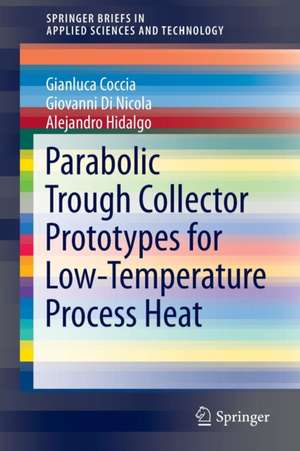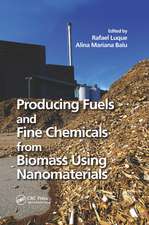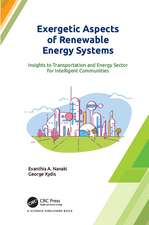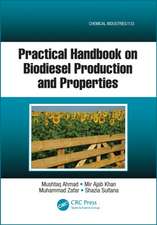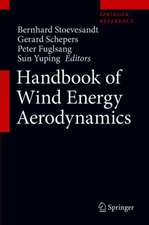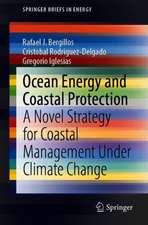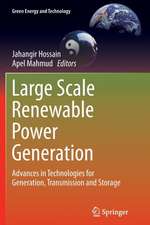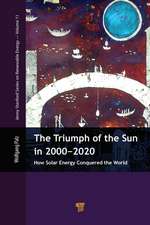Parabolic Trough Collector Prototypes for Low-Temperature Process Heat: SpringerBriefs in Applied Sciences and Technology
Autor Gianluca Coccia, Giovanni Di Nicola, Alejandro Hidalgoen Limba Engleză Paperback – 8 feb 2016
Din seria SpringerBriefs in Applied Sciences and Technology
-
 Preț: 380.29 lei
Preț: 380.29 lei - 17%
 Preț: 360.33 lei
Preț: 360.33 lei - 20%
 Preț: 386.11 lei
Preț: 386.11 lei -
 Preț: 380.07 lei
Preț: 380.07 lei -
 Preț: 377.95 lei
Preț: 377.95 lei -
 Preț: 382.32 lei
Preț: 382.32 lei -
 Preț: 376.59 lei
Preț: 376.59 lei -
 Preț: 379.09 lei
Preț: 379.09 lei -
 Preț: 378.12 lei
Preț: 378.12 lei - 20%
 Preț: 293.83 lei
Preț: 293.83 lei -
 Preț: 344.90 lei
Preț: 344.90 lei -
 Preț: 321.35 lei
Preț: 321.35 lei -
 Preț: 264.79 lei
Preț: 264.79 lei -
 Preț: 344.90 lei
Preț: 344.90 lei -
 Preț: 356.45 lei
Preț: 356.45 lei -
 Preț: 382.95 lei
Preț: 382.95 lei -
 Preț: 355.65 lei
Preț: 355.65 lei -
 Preț: 479.67 lei
Preț: 479.67 lei -
 Preț: 415.18 lei
Preț: 415.18 lei -
 Preț: 444.52 lei
Preț: 444.52 lei - 20%
 Preț: 301.85 lei
Preț: 301.85 lei -
 Preț: 409.43 lei
Preț: 409.43 lei - 20%
 Preț: 322.17 lei
Preț: 322.17 lei -
 Preț: 355.48 lei
Preț: 355.48 lei - 15%
 Preț: 462.51 lei
Preț: 462.51 lei -
 Preț: 377.18 lei
Preț: 377.18 lei -
 Preț: 355.92 lei
Preț: 355.92 lei -
 Preț: 382.95 lei
Preț: 382.95 lei -
 Preț: 378.12 lei
Preț: 378.12 lei -
 Preț: 378.12 lei
Preț: 378.12 lei -
 Preț: 380.07 lei
Preț: 380.07 lei -
 Preț: 380.07 lei
Preț: 380.07 lei - 20%
 Preț: 326.28 lei
Preț: 326.28 lei -
 Preț: 312.68 lei
Preț: 312.68 lei -
 Preț: 356.42 lei
Preț: 356.42 lei -
 Preț: 412.30 lei
Preț: 412.30 lei - 20%
 Preț: 225.31 lei
Preț: 225.31 lei -
 Preț: 378.12 lei
Preț: 378.12 lei -
 Preț: 376.59 lei
Preț: 376.59 lei -
 Preț: 195.87 lei
Preț: 195.87 lei -
 Preț: 376.22 lei
Preț: 376.22 lei - 20%
 Preț: 324.64 lei
Preț: 324.64 lei - 20%
 Preț: 288.73 lei
Preț: 288.73 lei -
 Preț: 377.57 lei
Preț: 377.57 lei -
 Preț: 261.91 lei
Preț: 261.91 lei -
 Preț: 381.98 lei
Preț: 381.98 lei -
 Preț: 273.63 lei
Preț: 273.63 lei -
 Preț: 410.85 lei
Preț: 410.85 lei -
 Preț: 379.68 lei
Preț: 379.68 lei -
 Preț: 374.30 lei
Preț: 374.30 lei
Preț: 376.96 lei
Nou
Puncte Express: 565
Preț estimativ în valută:
72.13€ • 75.50$ • 60.04£
72.13€ • 75.50$ • 60.04£
Carte tipărită la comandă
Livrare economică 31 martie-14 aprilie
Preluare comenzi: 021 569.72.76
Specificații
ISBN-13: 9783319270821
ISBN-10: 3319270826
Pagini: 100
Ilustrații: XIX, 80 p. 29 illus., 19 illus. in color.
Dimensiuni: 155 x 235 x 5 mm
Greutate: 0.15 kg
Ediția:1st ed. 2016
Editura: Springer International Publishing
Colecția Springer
Seria SpringerBriefs in Applied Sciences and Technology
Locul publicării:Cham, Switzerland
ISBN-10: 3319270826
Pagini: 100
Ilustrații: XIX, 80 p. 29 illus., 19 illus. in color.
Dimensiuni: 155 x 235 x 5 mm
Greutate: 0.15 kg
Ediția:1st ed. 2016
Editura: Springer International Publishing
Colecția Springer
Seria SpringerBriefs in Applied Sciences and Technology
Locul publicării:Cham, Switzerland
Public țintă
ResearchCuprins
Introduction.- Mathematical Modeling.- Standards and Testing.-Concentrator.- Receiver.
Notă biografică
Gianluca Coccia is a Ph.D.student of Industrial Engineering at the Department of Industrial Engineeringand Mathematical Sciences of Marche Polytechnic University, Italy. During hisBachelor and Master theses, he studied parabolic trough solar collectorsworking with two experimental prototypes and developing a mathematical modelable to determine the optical and the thermal efficiency of such systems. Hisdoctoral activity includes properties of fluids (thermal conductivity, dynamicviscosity, surface tension, virial coefficients), nanofluids and solar energysystems (parabolic trough collectors and solar cookers). He also studiesmathematical models and artificial neural networks applied to theaforementioned topics. He is author of papers published in international journalsin the field of solar energy and thermophysical properties of fluids.
Giovanni Di Nicola is associateprofessor in Environmental Applied Physics at the Faculty of Engineering of theMarche Polytechnic University, Italy. During the last 20 years, he conductedresearch, both experimental and theoretical, on thermophysical properties withparticular attention to environmental friendly refrigerants. He also developedtheoretical models for the prediction of surface tension, thermal conductivity,dynamic viscosity and virial coefficients of organic fluids. During the lastfive years, he turned his attention to the sector of solar thermal energy, inparticular studying parabolic trough collectors (PTCs) and solar cookers. He isa member of the editorial board of the International Journal of Thermophysics,of the Italian Thermophysical Properties Association (AIPT) and of theCommission B1 (thermodynamic and transport properties) of the InternationalInstitute of Refrigeration (IIR). He is author of over 70 articles ininternational journals with expert reviewers. Alejandro Hidalgo studiedIndustrial Technologies in the University Carlos III of Madrid. He started towork in the field of solar energy thanks to an Erasmus programme in the MarchePolytechnic University, Italy, under the supervision of Prof. Giovanni DiNicola. During his experience, he worked in experimental projects involvingparabolic trough solar collectors and solar cookers.
Caracteristici
Provides a concise overview of parabolic trough collectors (PTCs) Accessible to students, researchers and practitioners Offers technical solutions to overcome design problems Includes supplementary material: sn.pub/extras
